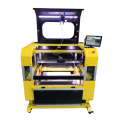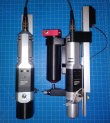Difference between revisions of "Overview"
| Line 107: | Line 107: | ||
<span style="color: maroon;">'''''Each of our Hyrel Module Heads are compared and contrasted in a table on our [[Head_Overview]] page.'''''</span> | <span style="color: maroon;">'''''Each of our Hyrel Module Heads are compared and contrasted in a table on our [[Head_Overview]] page.'''''</span> | ||
Note, for crosslinking heads, just | Note, for crosslinking heads, just use the standard heads and add the UV LED mechanism. | ||
For details about Filament-based print heads, please visit our '''[[Filament_Heads]]''' page. | For details about Filament-based print heads, please visit our '''[[Filament_Heads]]''' page. | ||
Latest revision as of 18:24, 23 February 2021
Welcome to Hyrel!
With literally thousands of materials to print on the Hyrel Printer, we have broken down the list of materials into logical groups based on their printing temperature and type of head used to print them.
A quick intro to many of the functions of a Hyrel printer can be found here.
If you are planning on using the heads which photoinitiate crosslinking, make sure you specify the correct wavelength of LED for your material.
A standard material printing data sheet has been created for many of the materials that have been internally tested; you can access this data by clicking here.
Always be sure of what material you are using, and what will be off-gassed.
Software and Firmware
Our equipment runs our proprietary Repetrel software and firmware. This was not done to be difficult, but because we didn't want to be restricted by the limitations of other printers. This is how we have the ability to adjust things like the Z position and material flow rate during a print. For a more in-depth look, please see the Repetrel page. To download and install, please see the Software page.
Hardware
There are two categories: Printers and Heads (or Accessories).
Printers
Hyrel Printers are available in the following models: Hydras are our larger, gantry models; Systems are our tabletop, enclosed models; and Engines are the smaller, unenclosed models - available in Standard Resolution (SR) and High Resolution (HR, for bioprinting) versions.
All models use our Repetrel software and any slicer (Slic3r support provided). Each model comes with a Windows PC, either tablet or full desktop style. We operate our print heads via CANbus.
Comparison
| Designation | Hydra 16A Freestanding Heated |
Benchtop, Enclosed Heating Optional |
Desktop, Unenclosed | Desktop, High Precision Unenclosed | |
|---|---|---|---|---|---|
| 16AS Hydra Standard |
16AT Hydra Tall |
System 30M | Engine SR | Engine HR | |
| Image | |||||
Each of our Hyrel Printers are compared and contrasted in a table on our Printer_Overview page.
The Hydra Series
The Hydra 16A models have hard resolution (with encoder feedback) of 20 microns in the X and Y, and 0.8 microns in the Z in standard mode. In microstepping mode, we can achieve soft resolution of 4 microns in the X and Y. It comes standard with two tool positions, but can take additional yokes to handle more.
There are three models, as detailed above. The differences are:
- The Hydra 16A-S (standard) has a 250mm Z and stands on the floor, with the following options:
- Can take a bed at 400x300mm or 600x400mm at 120°C or 200°C, or a sub-ambient bed;
- Can take the 40W CO2 laser and 5W, 450nm diode laser;
- Can take the Pick and Place setup; and
- Can take the 3-Phase and 1-Phase spindle tools.
- The Hydra 16A-T (tall) has a 500mm Z and stands on the floor, with the following options:
- Can take a bed at 400x300mm or 600x400mm at 120°C or 200°C, or a sub-ambient bed;
- Can take the 5W, 450nm diode laser (NO CO2 LASER);
- Can take the Pick and Place setup; and
- Can take the 3-Phase and 1-Phase spindle tools.
 Overview of the Hydra line
Overview of the Hydra line
The System 30M, 30, and 23
Systems are enclosed Detailed information is on the Systems page. The System 30M replaced the System 30, which replaced the System 23. For you history buffs and Kickstarters.
The Engines
Engines are open-air models. Engines can take up to four heads at once, either working cooperatively on a one print, or making duplicate copies of a small print at the same time. Build volume is 200mm x 200mm x 200mm (X/Y/Z). Detailed information is on the Engines page.
Modular Heads
| Filament Heads | Reservoir Heads | Hot/Cold Reservoirs | UV Light Heads | Laser Heads | Special Heads |
|---|---|---|---|---|---|
Each of our Hyrel Module Heads are compared and contrasted in a table on our Head_Overview page.
Note, for crosslinking heads, just use the standard heads and add the UV LED mechanism.
For details about Filament-based print heads, please visit our Filament_Heads page.
For details about Reservoir-based print heads, please visit our Reservoir_Heads page.
For more details about Lasers, see the Lasers page.
Nordson and ViscoTec Heads
Some customers have requested that we configure our equipment in such a way that heads from other companies like the Nordson Ultimus V heads or one of the Viscotec Vipro heads.
Yes, Hyrel equipment can accommodate these and other print heads with just a little custom code and a special tool holder. Please contact us if you have any questions at all.
Click image for a larger image.
Other Accessories
Accessories other than print heads are available, some of which take a tool position.
For more details about Spindle Tools and other accessories, see the Other_accessories page.










